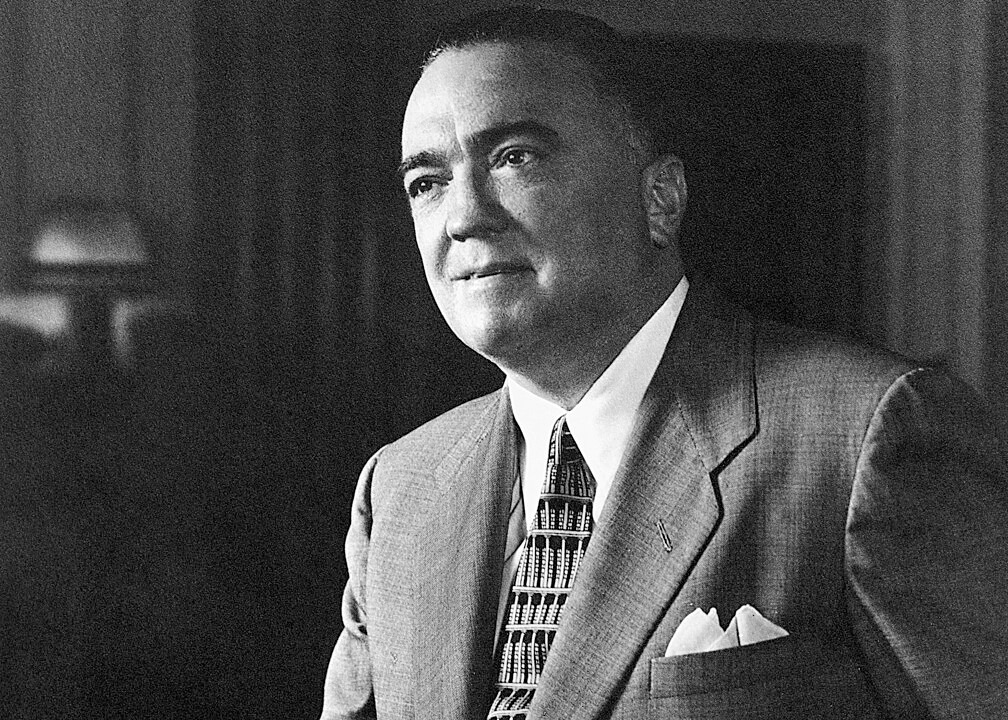
The Gospel of J. Edgar Hoover: How the FBI Aided and Abetted the Rise of White Christian Nationalism (Princeton University Press) by Lerone A. Martin
Searching for the gnarled roots of modern Christian nationalism in the United States, it might be tempting to point an accusatory finger at pastor Jerry Falwell and his “Moral Majority” of the late 1970s, when evangelical insurgents welded their cause to the suntanned triangulations of Ronald Reagan. Or perhaps the movement was born slightly earlier, when the advent of television gave the revival-hall hollering of minister Billy Graham a congregation of millions.
The truth is far stranger and more troubling: it was J Edgar Hoover, architect of the Federal Bureau of Investigation and its director for almost half a century, who did more than any fire-breathing churchman to turn fearful white suburbanites into the crusaders of a renewed conservative backlash.
As shown by Lerone A Martin in his slim, mildly repetitive but focused new study The Gospel of J. Edgar Hoover, the FBI capo was “the leading white evangelical statesman” in America from the 1950s until his death in 1972. Hoover believed the US was the “vehicle of a Divine force”, and thought of himself as a kind of warrior-priest or soldier-cop, a Sunday school teacher-in-chief who by his own personal devotion and immense political power could defend his country against the imagined assaults of godless communists and the very real demands of a Black population still awaiting their full emancipation. “The strength of our Judaic-Christian Tradition,” Hoover insisted, was an “anti-communist serum.”
We know that during his near half-century tenure as head of the FBI, Hoover turned his agency into a vast regime of spying, blackmail, sabotage and persecution.
Yet the FBI’s role as a conduit for the distribution of evangelical propaganda has been little understood until now. Hand in glove with the newspaper Christianity Today, the agency mailed countless copies of Hoover’s homilies and jeremiads to churches, schools, universities, businesses and government departments – an enormous network which wildly outstripped the subscription numbers of elite conservative magazines like National Review. All done on the taxpayer’s dime.
To get his vision of an anti-communist, pro-segregationist alliance out to the people, Hoover was highly ecumenical. A Presbyterian by birth, he was nonetheless determined to cultivate the influence of east coast Catholics, southern Baptists and mainline Protestants alike. He was just as happy posing for pictures with Billy Graham as he was brandishing the Sword of Loyola presented to him by the Jesuits.
Hoover was never “born again”, but that crucial theological difference was entirely overlooked by the pastors who cherished their relationship with him – and supplied him with intelligence on which churches might be communist “front groups.” In this sense, Martin writes, he “helped to stitch together the religious and political vision of an otherwise disparate community of evangelicals. He helped them become a united political front.” Long before Jerry Falwell brought evangelicals into the mainstream as a reliable voting bloc, Hoover had primed and mobilised them to be on their guard.
If religion and the law were the twin bastions of Hoover’s tenure as head of the FBI, he somehow always found a way to undermine both. The paranoid vision of a virginal and holy America defiled from within gave him the license to break the same rules he was supposed to enforce. “Violating laws to uphold the law” was not a last resort in moments of emergency but a God-given gold standard for the entire FBI. And for all Hoover’s piety, he spent most of his adult life in a covert relationship with his second-in-command Clyde Tolson. Martin does well not to put too much stress on Hoover’s hypocrisy: what he did to American public life was unimaginably sordid, his sexuality certainly wasn’t.
The Gospel of J. Edgar Hoover does not add much to the outrageous saga of the director’s hounding of Martin Luther King Jr (the best recent exposé being the documentary MLK/FBI), but it is worth remembering: at the root of modern Christian nationalism lies the nostalgic vision of anti-democratic white rule.
While the FBI’s attachment to this ideology is not so overt as it once was, their headquarters in Washington DC still bears Hoover’s name, and in its walls still grows the dark mould of its founder’s gospel.
This article is from New Humanist's autumn 2023 issue. Subscribe now.

